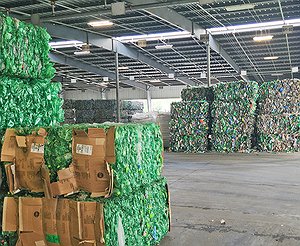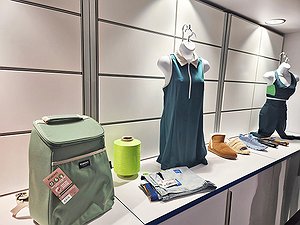REPREVE is positioned to shift U.S. PET recycling for clothing through ambitious goals that the company’s employees believe can be achieved through a commitment to reusing materials and relying on a close-knit family dynamic.
SUSTAINABILITY
REPREVE Spins Into Eco Partnerships With Family Culture, Corporate Sense
Sustainable yarn maker REPREVE has been making strides in sustainability since its 2007 founding in Greensboro, N.C. Its recent news was the release of a list of 37 brand partners that includes San Francisco–based Rothy’s, named to its annual Champions of Sustainability awards.
Rothy’s won REPREVE’s milestone award for transforming more than 100 million plastic bottles into its products using the yarn maker’s offerings made from recycled PET. Other winners from the Golden State included Boardriders, Buff, Gap Inc., Levi Strauss & Co., Momentum Textiles and Volcom.
REPREVE, a branch of parent company UNIFI, boasts an extensive list of clients, many of which are headquartered in California including Beyond Yoga, EleVen, Fitbit, Guess, H2OM, Manduka, Matek, Mediclo, Merge4, Next Level Apparel, O’Neill, Patagonia, Prana, Quicksilver, Roxy, Seea, TOMS, Vissla and Vitamin A. Although many of them are global labels, their partner, REPREVE, relies on a small-town approach with a global vision and invests in its employees for its worldwide sustainable evolution.
Sustainable bottle sourcing
Much of REPREVE’s North Carolina–made product is created by processing PET bottles at three factory sites: an approximately 160,000-square-foot bottle-processing center and a dye house in Reidsville, N.C., and a recycling center in Yadkinville, N.C., where traceable yarns are created from resin derived from plastic flake. The Reidsville bottle-processing center receives 60 truckloads each week—mainly from the East Coast. Jeff Sitler, operations manager at the center, noted that the company prefers to source from the Carolinas to support local initiatives; however, with REPREVE using more than 120 million pounds of baled bottles each year, reaching outside this region is necessary.
“We only have a small percentage of deposit material; most of ours is curbside,” said Sitler, who explained that REPREVE’s sourcing partners—waste management, public services and Sunoco sort and bale the plastics before selling to REPREVE, which purchases approximately 60 loads a week. “We buy the PET. It’s not 100 percent PET. It has a lot of things in it— contaminants, cans, other 2- through 7-type plastics, PPE, PVC. Our system sorts that out to get to the PET item, which is what we want for our REPREVE product.”
In addition to sourcing bottles from brokers on land, REPREVE also relies on a supply of plastics from the sea for its REPREVE Our Ocean, a premium fiber and resin collection. These pieces are collected by Oceancycle within 50 kilometers of the shores of countries whose recycling infrastructure is limited or nonexistent.
REPREVE is also putting its messaging where its manufacturing is by achieving zero-waste status at the Yadkinville, N.C., plant. The facility boasts bins for different types of waste—food, aluminum and, yes, plastic bottles.
“Any materials generated by the process, or employees, or the wrap on ear plugs—a little polyethylene plastic bag—all of that is being sorted, and we are working in many cases with partners to find outlets for that,” explained Chief Product Officer Meredith Boyd, who joined the company at the time of REPREVE’s launch in 2007.
While processes to properly reuse and recycle plastics other than PET, such as polyethylene and all byproducts from reusing bottles on a large scale are still being developed, REPREVE is examining how to bring additional solutions to the table.
“We have to be strategic. Where are there value-added opportunities to look for homes for the challenging waste materials? Where does it make more sense to work with an existing partner that may have a chain established?” Boyd said. “Polyester and nylon are core focus points today. It’s the world’s largest fiber going into textiles. We want to have impact where it’s big so the environmental impact can be large.”
Going greener didn’t begin at the start of the age of REPREVE, and many of the company’s employees have worked there for decades. They remember UNIFI’s commitment to reducing waste well before recycling efforts included transforming bottles into new apparel.
“When we dry the yarn, we reclaim that hot water to use in other places—ever since I was here in 1992,” noted Mark Shelton, site manager of the Reidsville, N.C., site’s dye operations. “When we formulate our dye formulas we exhaust all the dye into the yarn and do not have any going back down the drain.”
Globally scaling a local solution
In early 2023, REPREVE expanded its Textile Takeback program into Asia. The company also has plants in El Salvador and Colombia in addition to operations in Brazil. These moves are REPREVE’s efforts to solve a global problem and drive the solution to scale globally. By establishing a presence in key geographic locations around the world, while remaining committed to its U.S. plants, REPREVE is allowing nearshoring opportunities to grow for different regions around the world, but the Americas remain a priority.
“China is struggling right now as an economy, and that is impacting trade. The Ukraine war is really impacting us more now than anybody thinks or understands. It will become transparent five years from now,” Eddie Ingle, UNIFI CEO and director said. “The closest regions to the U.S. market will continue to be important. Nearshoring will continue to happen.”
REPREVE’s priorities over the latter half of the 2020s are ambitious, yet Ingle is committed to bringing the company’s goals to fruition.
“Whatever we do has to be scalable, and we’re moving more toward becoming a sustainable business. Our goal is to get to 50 percent recycled content of fiber sales by 2025,” explained Ingle. “When we talk about textile takeback, and we launched our staple fiber [a product made from 100 percent post-consumer PET bottles and pre-consumer fiber waste] last year, it was trying to solve the circularity problem as well as the sustainability problem and the desire to continue forward.”
























